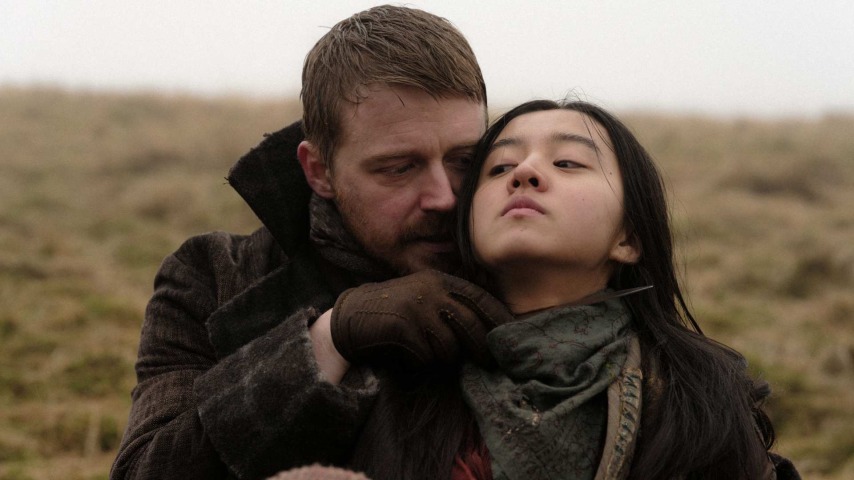It’s not that the Western is new territory for Scottish or Japanese storytelling; see Ted Kotcheff’s Billy Two Hats, Hideo Gosha’s Three Outlaw Samurai, and, yes, a handful of unassailable Akira Kurosawa masterpieces. It’s more that the specific combination of jidaigeki period piece, highland character study, and frontier justice that’s new, making Tornado a harrowing, blustery, violent amalgamation of an idiosyncratic spirit.
Scottish filmmaker John Maclean may be the only director working today with the specific peculiarities necessary for even imagining that mix, much less the chutzpah to give it a go. A decade has gone by since his debut, Slow West, an unconventional Western that leaned into the genre’s textures and tropes just as eagerly as it pulled away from them. Maclean has templated his second picture around this by likewise embracing elements from his assembled genres while simultaneously skirting around them. There are no shootouts in town thoroughfares, nor intense katana duels between sworn foes exercising their martial skills and steely gazes—though toward the end, the film does indulge in a sequence of bloody, one-sided slash-‘em-up fight scenes. What they lack in the gravitas of, say, Toshiro Mifune and Tatsuya Nakadai’s climactic crossing of swords in Sanjuro, they make up for with hyper-stylized thrills.
But a handful of combat shots, dope as Tornado’s are, do not a jidaigeki make. Maclean clearly has a reverence for Japan, though, and Tornado is braised in that sentiment. In Tornado, the place where Scotland and Japan meet is unforgivingly brutal, and the whole affair concludes in tears with the promise of future hope. If this is the relationship Maclean imagines for both countries, it’s a bleak one, though firmly in line with popular culture’s recent interest in media like Shōgun, where death and suffering result from the United Kingdom’s collision with the Imperial Court.
Tornado is far removed from Edo, taking place in the “British Isles,” according to a subtitle in the film’s opening moments. It’s a cold, barren, and unfriendly land, where seemingly no civilization is established save for one great house left in disarray after the first scene. Tornado (singer-songwriter Kōki), the film’s namesake protagonist, tears over hill and dale, on the run from Sugarman (Tim Roth), the casually heartless leader of a small gang comprising his son, Little Sugar (Jack Lowden), and thugs with names like Kitten (Rory McCann), Squid Lips (Jack Morris), and Psycho (Dennis Okwera).
Opening in medias res is a bold choice, which Maclean pays off predominantly in Kōki’s performance later on, in a quiet moment of contemplation when the worst has already happened. All the audience sees at first, though, is the girl, alone and fleeing from visibly dangerous men, ducking into a countryside manse to spare herself their wrath. Why she runs is immaterial. The visceral terror of her flight sufficiently fills in the blanks.
Tornado’s background, we later find out, is the stuff of both classic Western and jidaigeki cinema. Sugarman and his band of muddied men are fresh off a heist with two fat bags of gold coins; trekking to their hideout, they pause to take in a bunraku performance put on by Tornado and her father Fujin (Takehiro Hira), a puppeteer by trade and a samurai by spirit. As all youths do when circumstances dictate they work with their parents, Tornado takes on her role in the pageantry with a combination of reluctance, boredom, and mortification, until she spies a boy (Nathan Malone) making off with the gold while the bandits’ backs are turned. (Even half-assing it, she’s a good enough showbiz partner to Fujin to captivate an audience.)
When Tornado involves herself in the boy’s frankly idiotic choices, and when Sugarman finds the gold missing, a domino effect of pitiless murder is set off. Tornado is stoically eccentric, much like Slow West: It’s one part straightforward revenge tale and one part surreal, otherworldly reflection on how children regard their fathers, among other things. Tornado and Little Sugar each have a paternal chip on their shoulders, though they break it off in very different ways, perhaps in acknowledgment of either the differences between sons’ and daughters’ perceptions of their dads, or differences in Japanese and Scottish family structures. Considering the latter, one may expect the story to dramatize anti-migrant attitudes among insular populaces. But Maclean makes the subtle gesture of pseudo-naturalizing father and daughter. No one, not even Sugarman, or Little Sugar, who between them is the greater rogue, questions Fujin and Tornado’s presence. They are simply there, and going by dialogue exchanges peppered throughout the film, they’ve been there for a while.
Ennobling Sugarman is tempting; Roth’s easygoing, wearied expressions help, too, lending the character an implied philosophy of “live and let live, as long as they don’t take my money.” Wicked as he is, you get the sense he’d rather not fritter away his time chasing down his ill-gotten gains and sewing chaos along the way. Hira carries a bit of that weariness in his own work, folded up in personal pride and his responsibilities to Tornado, which require that he keep his anxieties stored away as neatly as a sword in its sheath. But it’s Kōki who dazzles most, portraying her, bit by bit, as a lioness making the gradual realization that she’s been living like a mouse. She’s magnetic in her ferocity and grace. By the time Tornado ends, one wishes for that most gauche of things, a spin-off, so we have an excuse to follow her on whatever adventures wait for her next in the highlands.
Director: John Maclean
Writer: John Maclean
Starring: Kōki, Jack Lowden, Takehiro Hira, Tim Roth
Release Date: May 30, 2025
